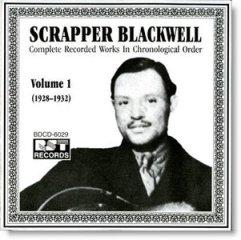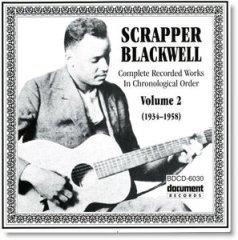Scrapper Blackwell – Complete Recording Works 1928 - 1958
Scrapper Blackwell – Complete Recording Works 1928 - 1958

Vol.1
01. Kokomo Blues ............ 03:05
02. Penal Farm Blues ........ 03:23
03. Mr. Scrapper's Blues .... 02:51
04. Down And Out Blues ...... 02:54
05. Trouble Blues Part 1 .... 03:04
06. Trouble Blues part 2 .... 03:02
07. Non Skid Tread - Scrapper Blackwell, Bertha "Chippie" Hill ... 03:11
08. Be Da Da Bum ............ 03:33
09. Springtime Blues ........ 03:15
10. Rocky Luck Blues ........ 02:58
11. Mean Baby Blues (Robinson's Knights Of Rest) ... 02:50
12. Rambling Blues .......... 02:35
13. Blues Day Blues ......... 02:48
14. Down South Blues ........ 02:59
15. Sneaking Blues .......... 02:50
16. Hard Times Blues ........ 02:52
17. Back Door Blues ......... 02:51
18. Down In Black Bottom .... 03:03
19. My Dream Blues .......... 03:04
20. Whiskey Man Blues ....... 03:16
21. Mix That Thing .......... 02:57
Vol.2
01. Morning Mail Blues ........ 03:27
02. Blues That Make Me Cry .... 03:16
03. Mean Mistreatin' Mama ..... 02:41
04. She's Alright With Me ..... 02:42
05. D Blues ................... 02:46
06. A Blues ................... 03:06
07. My Old Pal Blues [Dedicated to the Memory of Leroy Carr] ... 03:02
08. Bad Liquor Blues .......... 02:48
09. Alley Sally Blues ......... 02:52
10. No Good Woman Blues ....... 02:40
11. The Death of Leroy Carr ... 03:03
12. Smoky Mountain Blues ...... 03:10
13. Motherless Boy Blues ...... 02:43
14. Wayback Blues ............. 02:52
15. Texas Stomp ............... 03:29
16. Sail on Sail on Blues ..... 03:08
17. Hey Lawdy Mama ............ 02:59
18. Little Girl Blues ......... 03:56
19. Life of a Millionaire ..... 03:44
20. Little Boy Blue ........... 03:14
21. Blues ..................... 04:06
Francis ‘Scrapper’ Blackwell was born in 1903 in North Carolina and was still a child when his family moved to Naptown. (Indianapolis) Credited later as being the man responsible for moving the blues from the country to the city, Blackwell was a guitarist of highly impressive skills and a sensitive songwriter. Scrapper Blackwell is an important link to modern Urban Blues. He recorded throughout the late 1920s and '30s, most often with pianist Leroy Carr. The guitar style he developed based around sophisticated single string-soloing, pointed the way for the guitar heroics that became a big part of most Electric Blues in the '40s and '50s, whose major proponent was T-Bone Walker.
Leroy Carr was a songwriter with many stories to tell and in teaming with Scrapper Blackwell, a guitarist of enormous stature; the pair managed many hits in their time together. They were primarily known for the 1928 signature tune “How Long, How Long, Blues.” As a duo, they juggled immense popularity, busy recording schedules, jook joint performances, bootleg operations, arguments, and much more in their years together. Running the gamut from introspective blues, “You Got To Reap What You Sow,” and “Six Cold Feet In The Ground,” to the comical, near-hokum approach, “Box Car Blues” and “Papa Wants A Cookie.”
Although the partnership was a success on record, Leroy and Scrapper had their personal difficulties. At one session they went in together and a disagreement ensued, the two were separated; both finishing their studio time recording solo. Blackwell was reportedly dissatisfied with getting less than his fair share of credit and financial rewards as he claimed to have written many titles with his sister, Mae Malone. Whatever the disagreements, when Carr died in 1935, from Nephritis due to his extreme intake of alcohol, Scrapper mourned the loss of his longtime friend with “My Old Pal Blues” at a July session.
Scrapper went on to do quite a bit of recording on his own, “Bad Liquor Blues” is a fine 21 track testament to his wide ranging abilities and importance in both areas. Scrapper's “Kokomo Blues” from a 1928 recording session was reworked by Kokomo Arnold, another guitarist and bootlegger as well, and later by Robert Johnson into “Sweet Home Chicago,” which became the anthem for the Windy City. An intricate player, Blackwell was known for stunning treble runs, driving rhythms, and powerful string snaps that stunned the competition. His rolling “A Blues” and the equally impressive “D Blues,” both instrumental pieces from a 1935 date, show the evidence to great effect. His touching “Blues That Make Me Cry” and “Morning Mail Blues” from 1934 prove him to be rather adept at the piano as well, and the two-part “Trouble Blues” will satisfy any curiosity as to how deft he was with guitar in hand. The previously mentioned “My Old Pal Blues” following the death of Leroy Carr, shows Scrapper teamed with Dot Rice on piano in an attempt to recapture the earlier brilliance but was only successful, in impressing again, his fleet-fingered style.
As a solo artist, his records never sold anywhere near as well as when he worked with Carr. Indeed, the number of existing 78's with Blackwell as a solo artist attest to that, as they are rare items. Disgusted with the record business, he went to work as a laborer for the Indianapolis Asphalt Plant and only returned to music in 1958 after much coaxing from Art Rosenbaum. He went into the studio and recorded “Mr. Scrapper’s Blues,” this marvelous 1960 recording not only shows him to be in first-rate form as a guitarist and singer but also finds him playing some fine piano. The years of manual employment did nothing to diminish his skills and his newfound success finally bore some financial gain. Sadly, that success would be short-lived. He was shot and killed in 1962 following a dispute with a neighbor. ---James Nadal, musicians.allaboutjazz.com
download: uploaded anonfiles mega 4shared mixturecloud yandex sendmyway
Last Updated (Monday, 24 June 2013 22:18)









